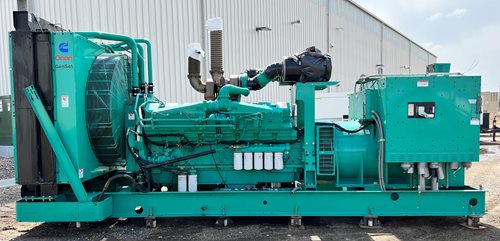How to Sell Your Commercial or Industrial Generator from Start to Finish
Many scenarios would bring about selling your industrial generator, whether it’s because you’re closing your business, your contract is over, or you’re looking to upgrade to a new generator. It’s understandable that asset recovery is on top of your mind and that you’d like to recover your equity, as you can inject that money back into your business or use it elsewhere. Here is what the industrial generator sale process will look like for you.
Collect Generator Information
Potential buyers are interested in knowing everything about the generator you plan to sell. They will want to know the manufacturer's name and model number, run hours, years in service, fuel type, age, and size in kilowatts. It’s also important to give them the service history and have records of repairs, inspection, and maintenance.
Collect all of the specific unit usage details (whether it was used as a primary generator or just for standby), which are a good indicator of the wear and tear on the equipment.
Photos of the generator are key to a good sale. Take clear photos of the generator showing all four sides, the engine, control panel, hour meter, ID tag, and other important parts. Photos provide a visual close-up of the generator and enable buyers to make a decision quickly since the condition and information are confirmed.

Find the Right Buyer
You have several options of places to sell your industrial generator. However, finding the right buyer is up to you. You should always do your research and look at the various options available to you, then choose the best one that suits your needs.
The best place to start is with your own network. Ask around to see if anyone has recently sold an industrial generator that had a positive experience. You can also search the internet for buyers, such as used generator vendors, or look for marketplaces where you can list your generator for sale. In either case, you’ll want to sell to a reputable buyer.
Reputable generator buyers can ensure quick, secure, and convenient transactions and may also provide decommissioning, removal, and shipping services. To help do your due diligence, search websites to see how long the company has been in business. Also, look at customer testimonials, certifications, and awards, and verify the company with the
Better Business Bureau.
Decommission the Generator
Before you sell a generator, it needs to be decommissioned, which essentially refers to the withdrawal of the generator from service. Industrial generator decommissioning requires an expert to inspect the electrical system and disconnect hundreds of wires, connections, and other components. Learn more about the other
steps involved in the decommissioning process here.
Decommissioning is also necessary because commercial generators are comprised of various parts and components that are regulated by state or federal law. These components have to be disposed of in the right way to avoid fines and other penalties. Decommissioning also ensures that the withdrawal process is safe and does not compromise the main electrical connections of the facility or cause any harm to people and the environment.
If your company has an experienced electrician, technician, and a project manager on staff, you may decide to decommission the generator yourself. Or, the buyer you choose may be able to decommission it for you.
Data centers require special consideration during decommissioning since they’re used in highly regulated industries with sensitive information. See our
checklist for data center decommissioning to stay compliant.
Make a Removal Plan
Removal of industrial generators involves scheduling and hiring a crane service to relocate them from your site onto transportation. They’ll have special equipment available like fork trucks, chain hoists, overhead cranes, and other equipment to make the move happen.
Indoor generators require extra attention since they may need to be disassembled partially to move them to a loading area.
You also need to consider shipping loads, packing the generator and components for shipping, and adhering to shipping regulations, which differ for each state.
If you have the capacity, then you can do all of these steps yourself. Or, the buyer (depending on who you choose) will sometimes provide removal and freight services, making it easier for you. That way, you can avoid costly freight charges or equipment rentals for transport.
Your timeline can have a huge influence on making your removal plan. Hiring a third party might be faster than handling the generator decommissioning yourself if you need to be out of a location by a particular date.
Sell Your Used Industrial Generator
If you’re looking for a reputable company to buy your used industrial generator, we can help. Generator Source purchases used commercial generators and can manage decommissioning and removal too. Check out our prior
decommissioning and removal case studies from over 35 years of experience.
If you have an industrial generator to sell soon,
submit your info and get top dollar from Generator Source.
Content Team
| 7/14/2022 10:59:21 AM
|
0 comments
Tags:
Selling Your Industrial Generator